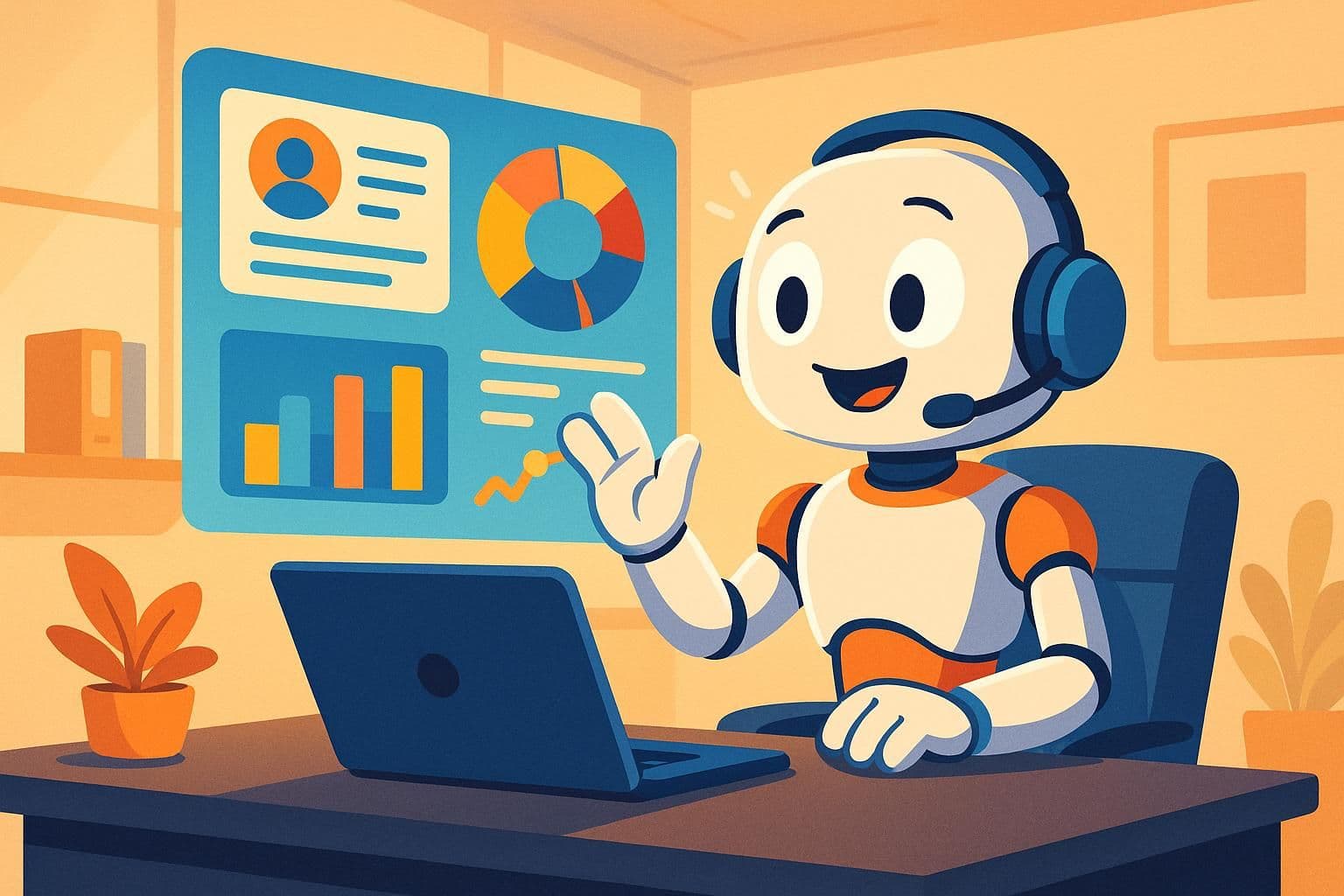AI Sales Agent: Intelligent Assistants for Revenue Generation
Explore how AI sales agents enhance revenue, improve customer satisfaction, and streamline sales processes through automation and data-driven insights.

AI sales agents are reshaping how businesses boost revenue. Companies using these tools report 6.2% higher sales and a 7% rise in customer satisfaction. By automating tasks like lead qualification and follow-ups, AI helps businesses prioritize high-value prospects and improve efficiency. For example, AutosOK doubled qualified leads, and Bewe achieved a 250% increase in booked meetings. Tools like Latenode make it easy to design AI workflows without coding, helping businesses streamline sales and integrate seamlessly with CRMs and communication platforms.
Key Benefits of AI Sales Agents:
- Faster Lead Qualification: Automates responses and scheduling.
- Improved Decision-Making: 80% of sales reps using AI leverage customer data better.
- Higher ROI: Revenue growth of 3% to 15% and ROI improvement by 10% to 20%.
Start leveraging AI today with tools like Latenode to simplify your sales process and stay competitive.
Microsoft’s New AI Sales Agents Explained
Creating AI Sales Agents Without Code
Low-code platforms have made it easier than ever to design AI-powered sales agents, even for those without technical expertise.
Getting Started with Low-Code Tools
Before diving into development, it's crucial to understand your sales process in detail. For instance, Vodafone achieved impressive results by first mapping out their lead qualification journey. This preparation allowed them to build an AI sales agent that significantly improved efficiency in handling manual tasks.
To set a solid foundation, focus on these steps:
- Define your automation goals: Identify repetitive sales tasks that could benefit from automation.
- Map your current workflow: Lay out each step of the sales process to pinpoint areas for improvement.
- Gather essential data: Collect customer information and sales metrics that will guide your AI agent's actions.
Building Sales Workflows in Latenode
Latenode simplifies the creation of AI-driven sales workflows with its intuitive visual builder. Using a drag-and-drop interface, you can design processes that connect specific triggers - like new lead submissions - to automated actions, such as lead scoring or personalized follow-ups.
For example, Campari Group uses a workflow where leads are automatically scored, follow-ups are triggered, CRM records are updated, and sales reps are notified. This streamlined process has helped them convert more qualified leads into customers.
By integrating Latenode with your existing sales tools, you can create a seamless, automated system tailored to your needs.
Connecting Your Sales Tools
The success of AI sales automation often depends on effective integration with your existing tools. Latenode’s extensive API library allows easy connections to popular sales platforms, ensuring all components work together smoothly.
| Integration Type | Purpose | Common Applications |
|---|---|---|
| CRM Systems | Manage customer data | Salesforce, Microsoft Dynamics 365 |
| Communication Tools | Automate outreach | Email, WhatsApp, LinkedIn |
| Analytics Platforms | Track performance | Google Analytics, Custom Dashboards |
A case study highlights the impact of proper integration: businesses using AI sales agents through a low-code platform saw faster deal closures, reduced manual data entry, and better lead response times [2].
To ensure success, keep data flows clean and synchronize systems regularly. Start small by integrating core tools, then expand as you become more familiar with the platform. This approach will help you build a robust, automated sales ecosystem step by step.
Top AI Sales Applications
AI is reshaping sales processes, enabling businesses to streamline workflows and boost revenue. By leveraging advanced tools, companies can enhance lead management, follow-ups, and customer service. In fact, 62% of marketers are already incorporating artificial intelligence into their sales strategies [5].
Lead Scoring with AI
AI-driven lead scoring is transforming how sales teams prioritize prospects, increasing productivity by 20% [4]. Unlike traditional methods that depend on fixed criteria, AI evaluates extensive datasets to pinpoint high-value leads with precision.
Heinz Marketing's Client Services Operations Manager, Brenna Lofquist, highlights this shift:
"AI plays a pivotal role in transforming lead scoring by automating the analysis of large data sets and provides more accurate predictions of conversion potential" [3].
The benefits are clear - 98% of sales teams report better lead prioritization after adopting automated scoring systems [5]. Some of the standout advantages include:
- Real-time evaluations based on customer behavior and patterns
- Continuous learning from past conversion data to refine predictions
- Reduced bias by removing subjective human judgment from assessments
- Seamless integration with existing CRM platforms for a unified approach
Automated Sales Follow-ups
AI-powered follow-up systems ensure leads are nurtured effectively without losing the personal touch. These tools adapt to recipient engagement, delivering messages at the right time and through the right channels.
To create impactful follow-up strategies, successful implementations focus on:
- Structured Sequences
Build workflows that guide prospects from initial contact to conversion. Include:- Informative content tailored to their interests
- Testimonials or case studies relevant to their needs
- Clear, actionable next steps based on their engagement
- Cross-Channel Coordination
Synchronize messages across various platforms, such as:- Email campaigns
- Social media interactions
- Direct messaging apps
- Internal notifications to sales teams
- Authentication and Compliance
Ensure trust by maintaining:- Proper email authentication (SPF/DKIM protocols)
- Regularly updated contact lists
- Adherence to GDPR and CAN-SPAM regulations
This level of coordination not only improves follow-up efficiency but also lays the groundwork for more sophisticated customer service automation.
AI-Powered Customer Service
As customer expectations rise - 82% of service professionals report growing demands [6] - AI is becoming indispensable for delivering timely and effective support. For example, Salesforce’s Service Replies, introduced in March 2023, provides agents with AI-generated, context-aware responses in real time, significantly enhancing customer interactions.
However, trust in AI remains a challenge; only 42% of customers currently believe businesses use AI responsibly, a drop from 58% earlier in 2023 [6]. To address this, effective implementations emphasize:
- Balanced Automation
Combine AI with human expertise by automating routine queries while escalating complex issues to live agents. This approach meets the personal touch expected by 81% of customers [6]. - Continuous Optimization
Regularly evaluate AI performance to:- Enhance response accuracy
- Improve personalization
- Adjust escalation triggers
- Keep knowledge bases up to date
- Security and Compliance
Protect customer data with measures such as:- Advanced encryption protocols
- Strict access controls
- Transparent privacy policies
These AI applications not only improve sales and service efficiency but also integrate seamlessly into platforms like Latenode, enabling businesses to scale their operations while driving revenue growth. By automating repetitive tasks and focusing on high-impact activities, companies can stay ahead in a competitive market.
sbb-itb-23997f1
Setting Up Effective AI Sales Systems
AI sales automation requires careful planning and dependable data to function effectively [8]. These foundational steps are essential for creating scalable and secure AI-driven sales systems.
Preparing Your Sales Data
To get the most out of AI tools, your sales data must be well-organized, accurate, and consistent.
Organize Your Sales Data
- Ensure Accessibility: Sales data should be readily available and structured to include:
- Customer interaction history
- Purchase records
- Communication logs
- Lead qualification criteria
- Sales performance metrics
- Maintain Data Quality: Keep your data clean and reliable by:
- Removing duplicates and standardizing formats
- Updating outdated information
- Verifying contact details
- Documenting data sources for transparency
- Define Clear Outcomes: As Salesforce advises, "When you can answer 'yes' to all these questions, it's time to analyze whether your data has predictive potential" [7].
Once your data is in order, the next step is to focus on building systems that support growth.
Building for Growth
Companies like RingCentral have demonstrated the power of AI in sales, achieving a 44% increase in productivity through predictive lead scoring [8].
Integration Architecture
- Link your CRM with AI tools to streamline workflows.
- Automate data synchronization across platforms.
- Design adaptable workflow templates for various scenarios.
- Enable multi-channel communication to reach prospects effectively.
Monitor Performance Metrics
Keep a close eye on these indicators to measure the success of your AI systems:
- Response times
- Lead conversion rates
- Customer engagement levels
- Sales cycle duration
- Revenue contribution
Data Security and Rules
With a staggering 690% increase in AI-related incidents between 2017 and 2023 [9], securing your data is a top priority. Implement these safeguards to protect your systems:
| Security Layer | Purpose |
|---|---|
| Data Protection | Encryption, access controls, data masking |
| Compliance | Adherence to GDPR, regular audits |
| Authentication | Multi-factor authentication, role-based access |
| Monitoring | Real-time anomaly detection, audit logs |
Best Practices for Security
- Develop AI-specific data access policies.
- Automate the classification of sensitive data.
- Conduct routine security assessments to identify vulnerabilities.
- Maintain comprehensive audit trails for accountability.
- Train your team on key security protocols to avoid breaches.
Conclusion
AI sales agents are reshaping the way businesses generate revenue, offering tangible benefits for organizations of all sizes.
Key Takeaways
AI tools improve sales performance, enhance customer satisfaction, and streamline operations. These outcomes are achieved by automating repetitive tasks, allowing sales teams to focus on more strategic efforts. The rising adoption of AI in sales highlights its effectiveness in optimizing workflows and deepening customer engagement.
If you're ready to embrace this shift, the journey begins with a single step.
Start Your First Latenode Project
Kick off your AI sales automation journey by following these straightforward steps:
- Define Your Objective
Start with a specific goal, such as improving lead qualification or automating follow-up communications. - Choose a Starting Point
Focus on one critical sales process to automate. For instance, automating meeting scheduling can deliver noticeable results. - Create Your Workflow
Use Latenode's intuitive visual platform to build your first workflow:- Integrate your key sales tools
- Set up AI-driven decision points
- Establish clear success metrics
Real-world examples highlight the potential of this approach. AutosOK doubled its qualified leads by using an AI agent for WhatsApp-based lead qualification. Bewe saw a 250% increase in booked meetings, while Humana achieved a 400% boost in product conversion rates [1].
Looking ahead, Gartner projects that by 2025, 30% of outbound marketing messages from large organizations will be AI-generated [1]. By adopting solutions like Latenode today, businesses can secure a competitive edge in the evolving landscape of AI-driven sales.
FAQs
How do AI sales agents help businesses qualify leads and manage follow-ups more effectively?
AI sales agents simplify the lead qualification process by examining data to forecast buyer behavior and assigning flexible scores to leads. This allows sales teams to focus their efforts on the most promising prospects while customizing their approach to improve engagement.
These agents also handle repetitive tasks such as initial outreach and follow-ups, ensuring timely communication without overwhelming human team members. Beyond that, they can enhance lead profiles by collecting and organizing essential customer details, providing sales teams with a more complete view of potential clients. By managing these routine activities, AI sales agents allow your team to concentrate on building strong customer connections and closing deals effectively.
How can I create AI-powered sales agents using a low-code platform like Latenode?
Creating AI-powered sales agents using a low-code platform like Latenode is a simple and effective process. Start by pinpointing the sales tasks you'd like to automate - this could include lead qualification, follow-ups, or managing customer interactions. Once you've outlined these processes, Latenode's tools make it easy to integrate APIs and connect them with AI models. These models can take on tasks like analyzing customer data or crafting personalized responses.
Latenode's intuitive low-code interface lets you design workflows that are specifically tailored to your business needs. These workflows can automate repetitive tasks, improve communication, and increase operational efficiency. By blending automation with smart decision-making, your AI sales agent can not only help drive revenue but also enhance the overall customer experience.
What makes AI-driven lead scoring different from traditional methods, and how can it benefit sales teams?
AI-driven lead scoring uses machine learning to process vast amounts of data, identifying which leads are most likely to convert into customers. By analyzing patterns in past behaviors, preferences, and interactions, it creates a detailed profile of an 'ideal customer.' This method moves beyond the limitations of traditional approaches, which often depend on manual scoring and subjective judgment.
With automation, AI not only saves time but also minimizes human error and provides quicker, more precise insights. This allows sales teams to concentrate on the most promising opportunities, streamline their efforts, and achieve stronger results.
Related posts



